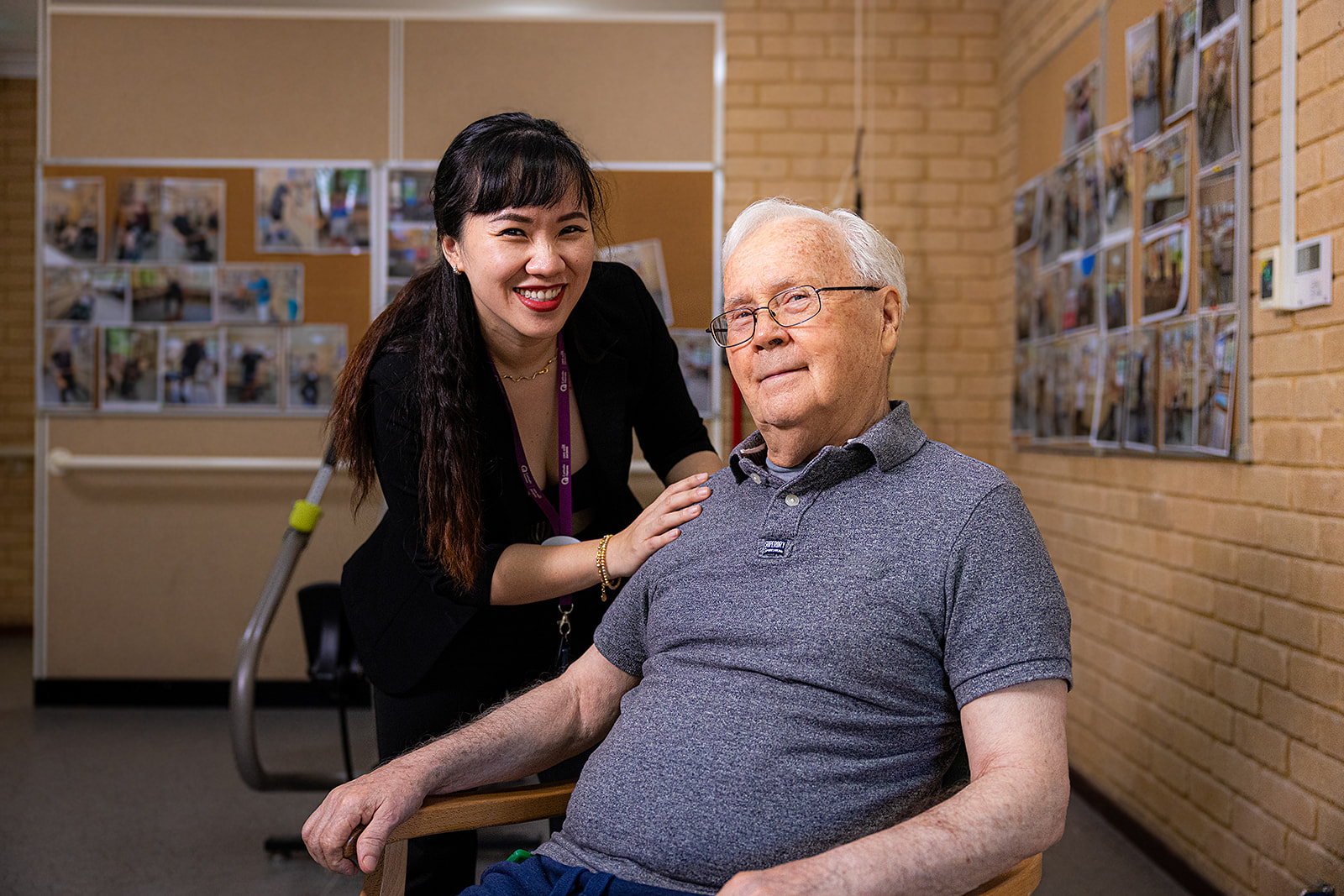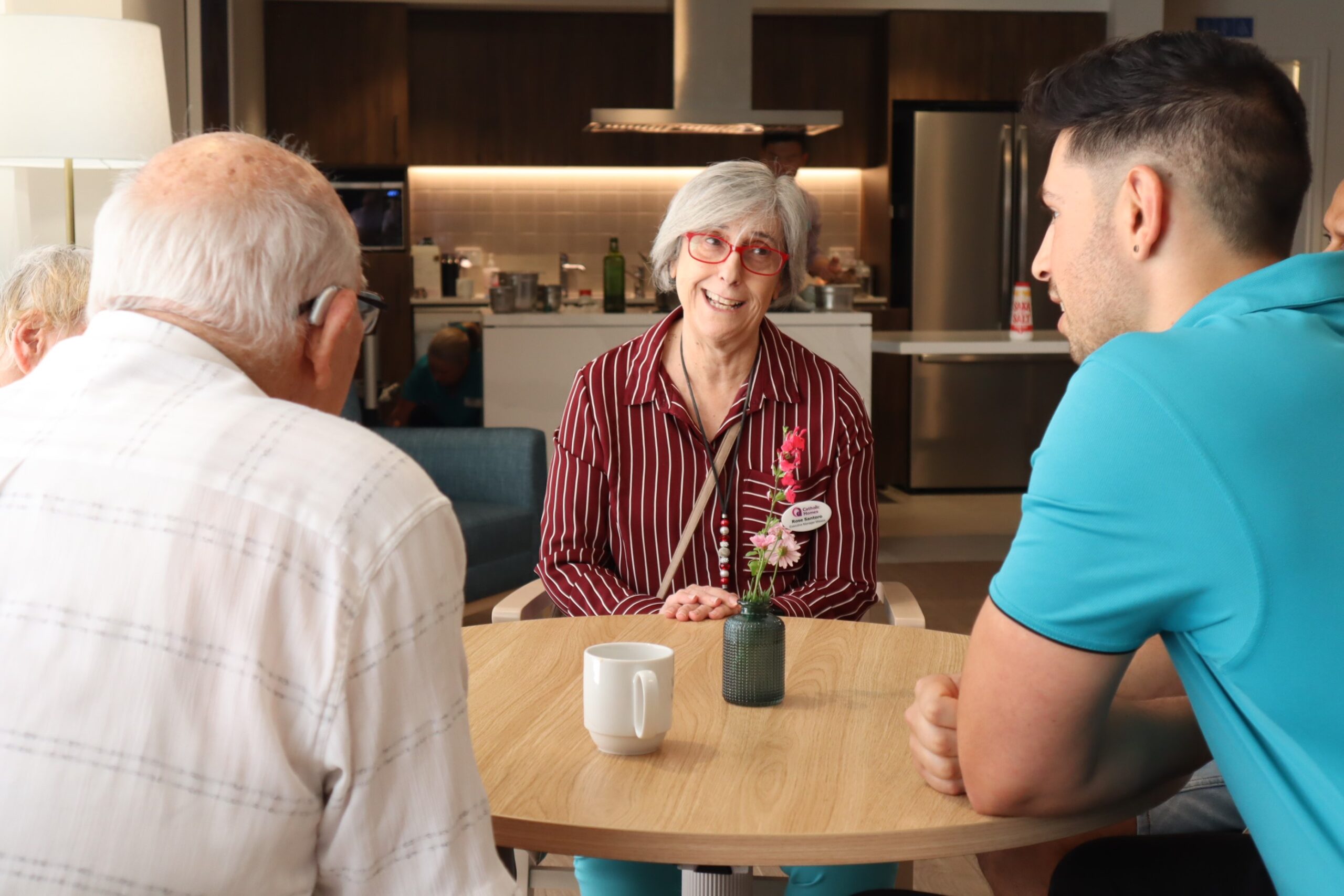What is Palliative Care?
Palliative care at Catholic Homes is about more than medical treatment – it’s about ensuring comfort, dignity and quality of life for people living with a life-limiting illness. We provide holistic support that focuses on managing pain symptoms while addressing emotional, social, cultural and spiritual needs.
Our approach to palliative care is person-centred and family-centred. It involves working alongside our residents, their families, and their broader care team to provide compassionate support through end-of-life care, with bereavement support for loved ones.
Our Approach to Palliative Care
We provide a team-based approach to palliative care that includes:
- Pain and symptom management delivered by experienced clinical staff
- Emotional and spiritual care from our pastoral and allied health teams
- Support for families and carers, including grief and bereavement support
- Tailored care planning that reflects the individual’s goals and preferences
- Access to helpful information and resources, including connections to local community services and supports
You or your loved one will stay in your room throughout – a familiar, private and peaceful environment that provides comfort during this important stage of life.
Our end-of-life care is supported by dedicated palliative care trolleys, on-site clinical staff, and a network of internal and external specialists in palliative care. These resources ensure that comfort, dignity, and support are always close at hand.
We are here to walk alongside you and your loved ones – offering guidance, connection and support through every step of care. Our team works closely with GPs, specialists and other providers to ensure your care is coordinated, respectful, and aligned with your wishes.
This is Care with Purpose – where compassion and connection guide everything we do.
Catholic Homes Palliative Care
Palliative Resources
Palliative Care
At each of our facilities, you can access information about palliative care for residents, families, and staff. It offers education and resources to build awareness, guidance on available services, support for families and carers, and tools for advanced care planning and goal setting.
Please speak with a member of the Pastoral Care team or the Facility Manager.


Information and the forms needed for advance care planning in Western Australia.
Advanced Care Planning
Advanced Care Planning
Information and the forms needed for advance care planning in Western Australia.
Resources and Support Material
What is palliative care?
The ‘What is palliative care?’ brochure is a perfect starter guide if you want to know more about palliative care. The brochure answers key questions, including:
- Who is palliative care for?
- What care is provided by palliative care?
- When can palliative care help?
- Who provides palliative care?
- Where is palliative care provided?
- How is palliative care accessed?
Starting the conversation
Starting the conversation about advance care planning is an important first step in ensuring that a person’s preferences for future care are known and respected.
If a person’s preferences are not known, doctors may use aggressive treatments that the person might not have wanted – and families may feel burdened by the worry that they will make a wrong choice.
Thinking about and planning for the future is a regular part of life, so you shouldn’t be afraid to raise the subject.
Questions that matter the most
What matters most discussion starters
Palliative Care Australia’s (PCA) Discussion Starter series and Card packs have been developed to reach into communities to normalise early conversations about the end-of-life, rather than waiting until more time-critical or medical-focused discussions need to occur. The resources have been developed to help Australians work out what’s right for them if they were to become very sick or at the end of their lives.
What is advance care planning?
Advance care planning involves planning for your future health care. It enables you to make some decisions about the health care you would or would not like to receive if you become seriously ill and unable to communicate your preferences or make treatment decisions.
Advance care planning allows you to think about, discuss and record your preferences for the type of care you would like to receive and the outcomes you would consider acceptable. Advance care planning helps to ensure your loved ones and health providers know what matters most to you and respect your treatment preferences.
Why it’s important
Advance care planning benefits everyone: your family, carers and health professionals.
- It helps to ensure you receive the care you want
- It improves ongoing and end-of-life care, along with personal and family satisfaction.
- Families of people who have undertaken advance care planning have less anxiety, depression, and stress and are more satisfied with care.e
- For healthcare professionals and organisations, it reduces unnecessary transfers to acute care and unwanted treatment.
Planning is for everyone
Everyone should consider advanced care planning, regardless of age or health. Ideally, you should start planning when you’re healthy—before there’s an urgent need for a plan.
It is vital if you:
- are older
- have a chronic illness
- have multiple diseases
- have an early cognitive impairment
- are approaching the end of your life
Advance care plans
An advance care plan is created by someone else on behalf of someone who is diminished or unable to make decisions for themselves.
An advance care plan can include an individual’s beliefs, values, and preferences regarding future care decisions. It is often helpful in providing information for substitute decision-makers and health practitioners and may guide care decisions, but it is not necessarily legally binding.
Some states and territories provide forms to help document an advance care plan for a non-competent person.
Advance Care Planning Brochure
How to Plan Your Medical Future | Advance Care Planning
Caring for a family member or friend?
Are you a carer?
A carer is someone who provides unpaid care and support to a family member or friend who is living with disability, mental health challenge, long-term health condition, alcohol or substance dependency, or who is frail aged. Caring for someone can be a big commitment. People become carers in many different ways and for a variety of reasons. Each circumstance is unique. Carers need to look after their own mental and physical well-being. Carers WA helps carers in any caring situation.
Understanding the dying process
An information booklet for families.
What to do When Someone Dies?
Locate important documents
- Find the person’s will and any advance care directives or funeral plans.
- These documents may outline their final wishes or legal instructions.
Register the death
- Contact a funeral director who can help register the death with your state or territory’s Registry of Births, Deaths and Marriages.
- Request multiple certified copies of the death certificate for legal and financial matters.
Notify key organisations
- Contact Services Australia to report the death – this can stop payments and prevent overpayments.
- Use the Advice of Death form, call the Older Australians line, or visit a service centre.
- Use the Australian Death Notification Service to notify multiple organisations simultaneously.
- Inform banks, superannuation funds, insurance providers, utilities, and other services.
Arrange the funeral
- Decide on the type of service (burial or cremation) and who will lead the ceremony.
- Check for a prepaid funeral plan or funeral insurance to help with costs.
- If eligible, you may use Centrepay to help manage funeral expenses.
Seek support
- Emotional support is just as important as practical arrangements.
- Catholic Homes offers bereavement care and support for families.
You can also contact support services such as:
- Griefline (1300 845 745)
- Lifeline (13 11 14)
- Beyond Blue (1300 22 4636)
Suggested reading
- To Die Well: A Catholic Neurosurgeon’s Guide to the End of Life, Stephen Doran
- What Dementia Teaches Us About Love, Nicci Gerrard
- With the End in Mind: How to Live and Die Well, Kathryn Mannix
